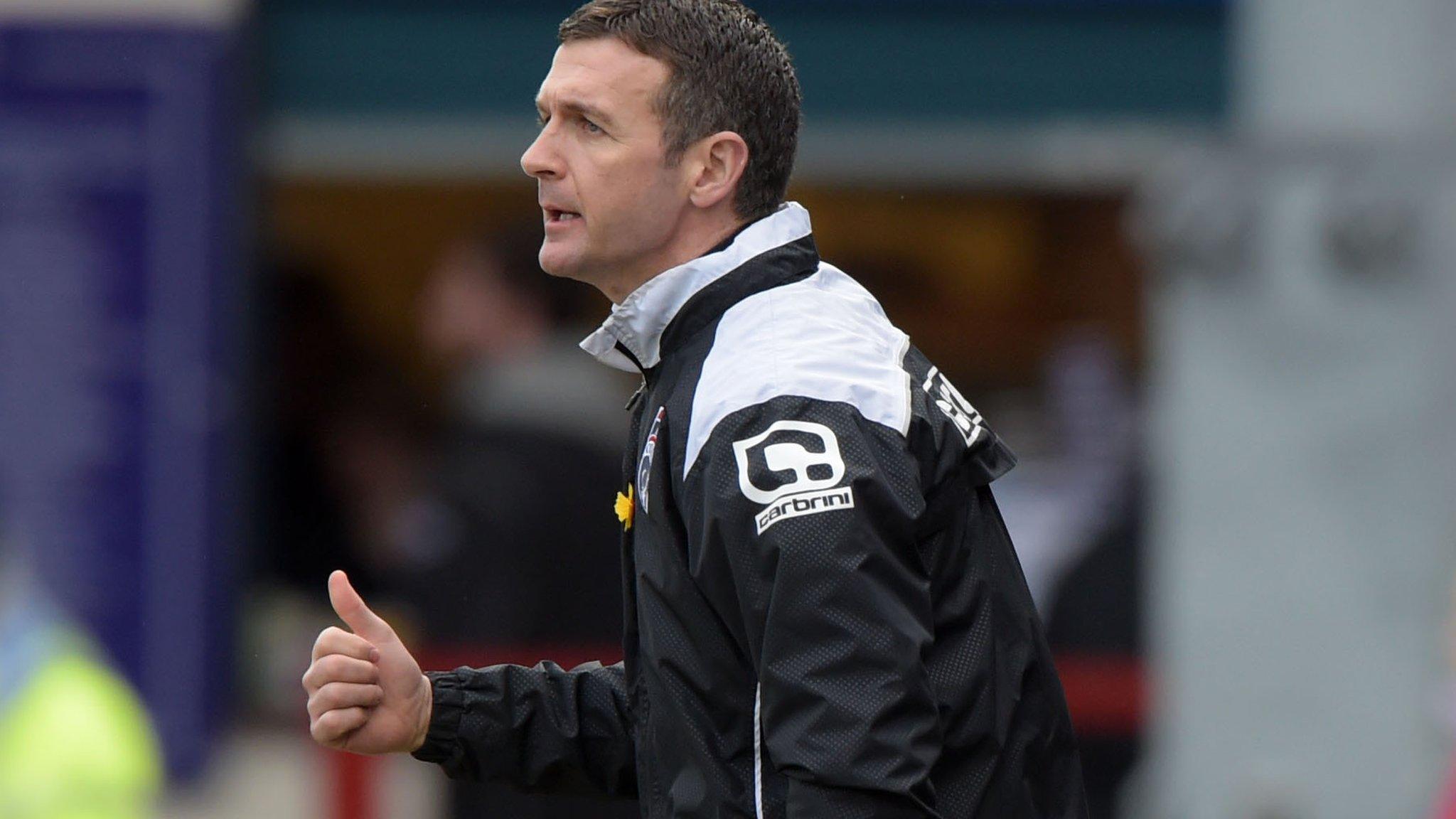Tom English's weekend column: Rangers, Calcutta Cup & Blatter
- Published
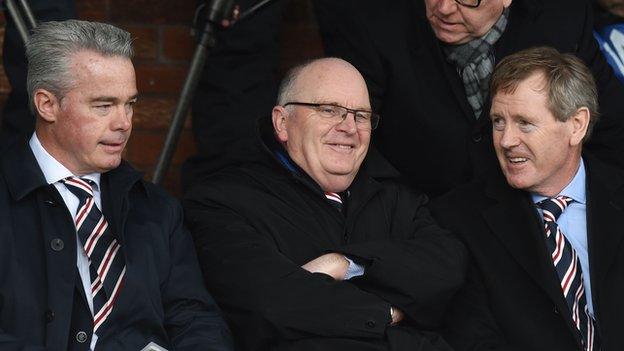
Paul Murray, John Gilligan and Dave King have taken charge of Rangers
A year ago, Dave King sent a shot across the bows of the Rangers board by way of some fighting talk from his home in South Africa about what life would be like if he was to force regime change at Ibrox.
He spoke of the epic rebuild that was required across all corners of the club and how the reigning, and toiling, board were ill-suited to the job. And he talked numbers.
He said he would personally invest £30m of his own money in order to help end the chaos but stated that upwards of £50m was going to be required to get it in a position whereby it could start lighting fires under Celtic's rear-end.
The £30m was his children's inheritance, he said. He'd talked to his kids about spending it on Rangers and they had said: "Go for it, dad." That was a powerful message to be sending out.
Those numbers aren't mentioned so much these days. The narrative now is that King will invest 50% of what is required and that others will invest the other 50%. King's, and Paul Murray's, estimate of what's required is £20m - or just north of £20m. In the last few days, there has been no mention of £30m, or £50m, or his children's inheritance being invested in the rebuilding of Rangers.
Twenty million might be the short-term figure. Very short-term given how much money this club requires just to try to nudge it forward.
We're not talking some David Murrayesque hubris. We're not talking about transfer 'war chests'.
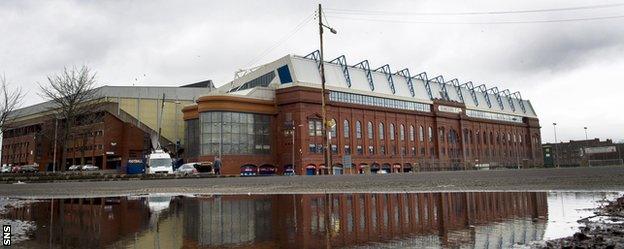
Dave King says Rangers' Ibrox Stadium is "dilapidated" and requiring investment
The scale of the neglect at Rangers over the last four years has been such that an awful lot of money is going to have to be spent on basic infrastructure just to get the club functioning normally. King's vow that he has £30m to invest as part of a £50m package would want to have some substance.
Amid all the understandable emotion of Friday, and the broad brushstroke language of restoring pride in a battered institution, there hasn't been many specifics from King on how much money he and his team have access to and who, exactly, is providing it. As Rangers men, they know precisely what needs to be done, but what remains an issue in all of this is whether they have the finance to do it.
King has described Ibrox as "dilapidated" and has spoken about the complete absence of even the most basic footballing infrastructure at the club. He has employees (two in particular) and managers and players who need to be moved on.
He has a stadium to spruce up, a coaching system to put in place, a management team to employ and players to recruit. Lots and lots of players.
Saturday's soul-less draw against Cowdenbeath hammered home that point forcefully. Not that it needed hammering home.
A few weeks back, King, Murray and John Gilligan might have checked the fixture calendar for Saturday 7 March - the day after the emergency general meeting that would dismantle the old board and sweep the new one into power. They would have felt sure of victory on the Friday and, once they saw the way the schedule had worked out, they must have been pretty confident of victory on Saturday also.
They would have looked at the match against Cowdenbeath and fancied their chances of beginning their new regime with a feel-good win on the road. And that optimism would surely only have hardened in the weeks leading up to the big vote.
Even before last weekend's monstering by Hearts, Jimmy Nicholl's team had shipped six to Falkirk, five to Queen of the South, five more to Hibs and, earlier in the season, another five to Hearts. Then Hearts hit them with them with another 10, thereby bringing Cowdenbeath's goal difference to a scarcely believable -45. They are football's equivalent of a giant sieve.
Not just a Scottish football equivalent - a European football equivalent. Trawl through the leagues, from the Israeli Ligat to the EuroStik Northern Premier (and the Southern Premier, too, for that matter) and you struggle to find another team with such a jaw-dropping goal difference.
Blackpool in the English Championship are -40. Dordrecht in the Eredivisie are -42. There's a team called Niki Volos in the Greek Super League who are sitting on -53, but that's because they've been chucked out of the competition and all their games are recorded as 3-0 walkovers.
Only when you get to the Ryman Premier League and Bury Town do you find a side in Europe with a goal difference higher than Cowdenbeath's. Bury Town are -48. On Saturday, they conceded four to Billericay.
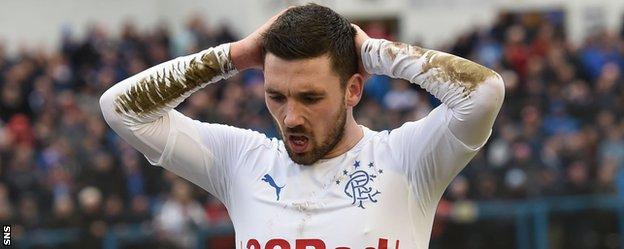
Rangers were unable to find the net against a leaky Cowdenbeath defence
Rangers have been desperately poor for large chunks of this season, but if anybody expected the combination of Cowdenbeath's hapless form and the surge of optimism from Friday's EGM to have an impact on the team then they were disabused of the notion.
The visitors had Kris Boyd and Kenny Miller on the pitch and yet couldn't score a goal or, it seems, raise much of a gallop. Afterwards, the interim manager, Kenny McDowall, spoke about the weather conditions making life difficult for his team.
This is what it has come to. This is what King, Murray and Gilligan, as well as Douglas Park, have inherited.
It was another reminder - lest it was needed - that Ibrox needs a complete cull. The place is riven with players and management that have the fortitude of a blancmange.
The "King Dave" headlines were inevitable given the major victory he won over the old, and clueless, board, but being in power is a lot harder than being in opposition. When you're in opposition and you promise £30m of your money and £50m overall to reconstruct this broken club then people tend to cheer.
As much as the promises of Friday will have appealed to the heart and soul of the Rangers support, the hailing of King in sections of the media as the great redeemer and the Castlemilk Messiah is wholly premature. In the coming years, King and his team should be judged not on what they say they are going to do but what they actually do.
Can Scotland Bear up at Twickenham?
Imagine the pair of them, Iain 'The Bear' Milne in one bed and Colin Deans in the other on that March morning in 1983, the day Scotland beat England at Twickenham for the last time.
Deans had woken with a rumble in his tummy He thought it was something he ate.
He mentioned it to The Bear and the response from The Bear could not have been mistaken for sympathy. Milne thought his mate was suffering from nerves rather than sickness.
In a sense, he was right on both counts. Deans was a little anxious about the match and, after he'd thrown up his lunch, a lot anxious about his health.
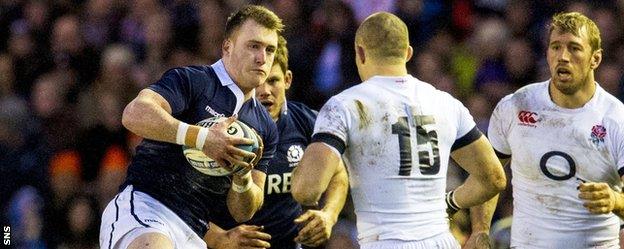
Scotland were beaten 20-0 by England at Murrayfield last season
Reliving the story of that team in Twickenham is to be reminded of how physically and mentally tough they were. Like Deans, Iain Paxton had concerns of his own.
He'd won 11 caps up until then and all of them had come at number eight. Against the English, he was picked in the second-row. The last time he'd played in the row he was in school.
Scotland had lost three games in a row going to Twickenham, but their confidence was undimmed. Jim Aitken looked at the England pack and called them "roly poly".
Paxton wasn't a huge fan of them either. The Bear was up against Colin Smart in the scrum and felt sure that Smart was past his best.
They believed they were better and they proved it. They won 22-12.
In the aftermath, Deans said he was skipping the banquet and going to bed to die. The Scottish Rugby Union wouldn't hear of it.
He was to attend and drink like a man. He slipped away at 10pm. The rest of them were still going 10 hours later.
Changed days in so many ways. England got the wooden spoon that season; the season after, Scotland got the Grand Slam.
In all the visits to Twickenham in all the seasons that followed, Scots have evoked the spirit of '83, but it hasn't worked.
It was a bit of an upset when Deans and the boys won there 32 years ago, but it would be a sensation to beat all sensations if it happens again on Saturday.
Blatter's blunt-edged sword
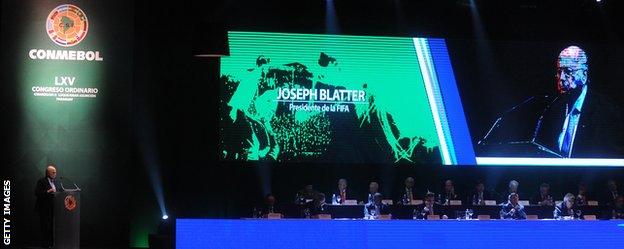
Fifa president Sepp Blatter addressed CONMEBOL about racism in football
Sepp Blatter has again spoken about racism in football, stating that the game needs to get a whole lot tougher on clubs and nations whose supporters abuse players.
Blatter was speaking to members of the South American federation CONMEBOL, but he could have been transported back in time, to Buenos Aires in 2001, because the mantra he was coming out with then, at a major anti-racism meeting, was the same as the one he came out with last week and, in the years in between, not a great deal has changed.
In the past, Blatter has spoken about the Sword of Damocles being lowered on clubs and countries who cannot stop their fans from racially abusing footballers.
At one point, he promised "more than the Sword of Damocles" would come down on these people by way of points deductions and expulsions from major tournaments.
In 2006, he launched Fifa's new anti-racism measures and said that it would be a "day for tears" if clubs or nations were found guilty of bigoted chanting.
They'd be docked points and would be thrown out of competitions if the abuse continued. Didn't matter who they were. Big names or small. They'd be gone if they were guilty.
He's still saying it. Still threatening. Still saying he'll reach for the sword. It's been a long wait.
- Published7 March 2015
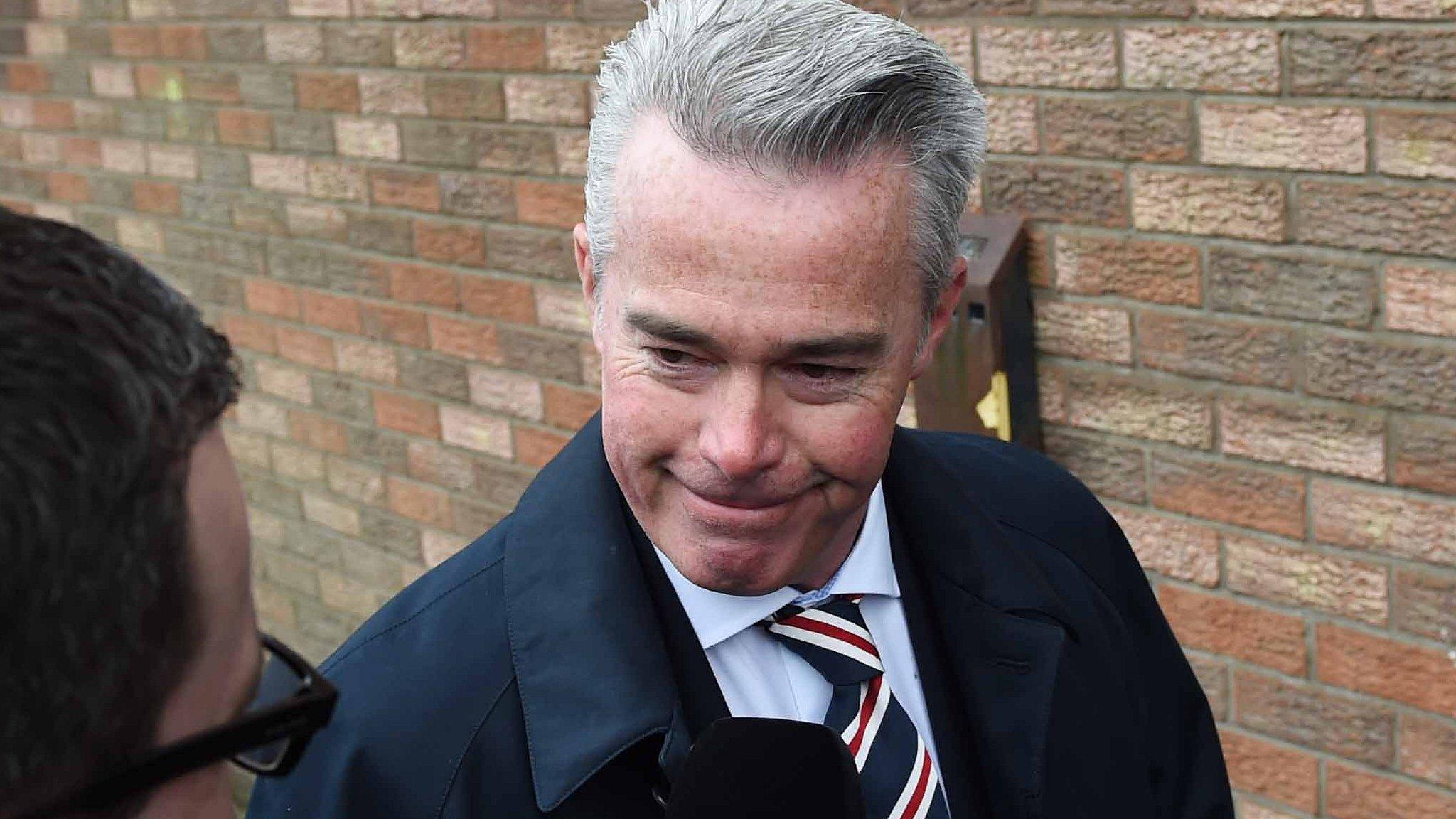
- Published7 March 2015
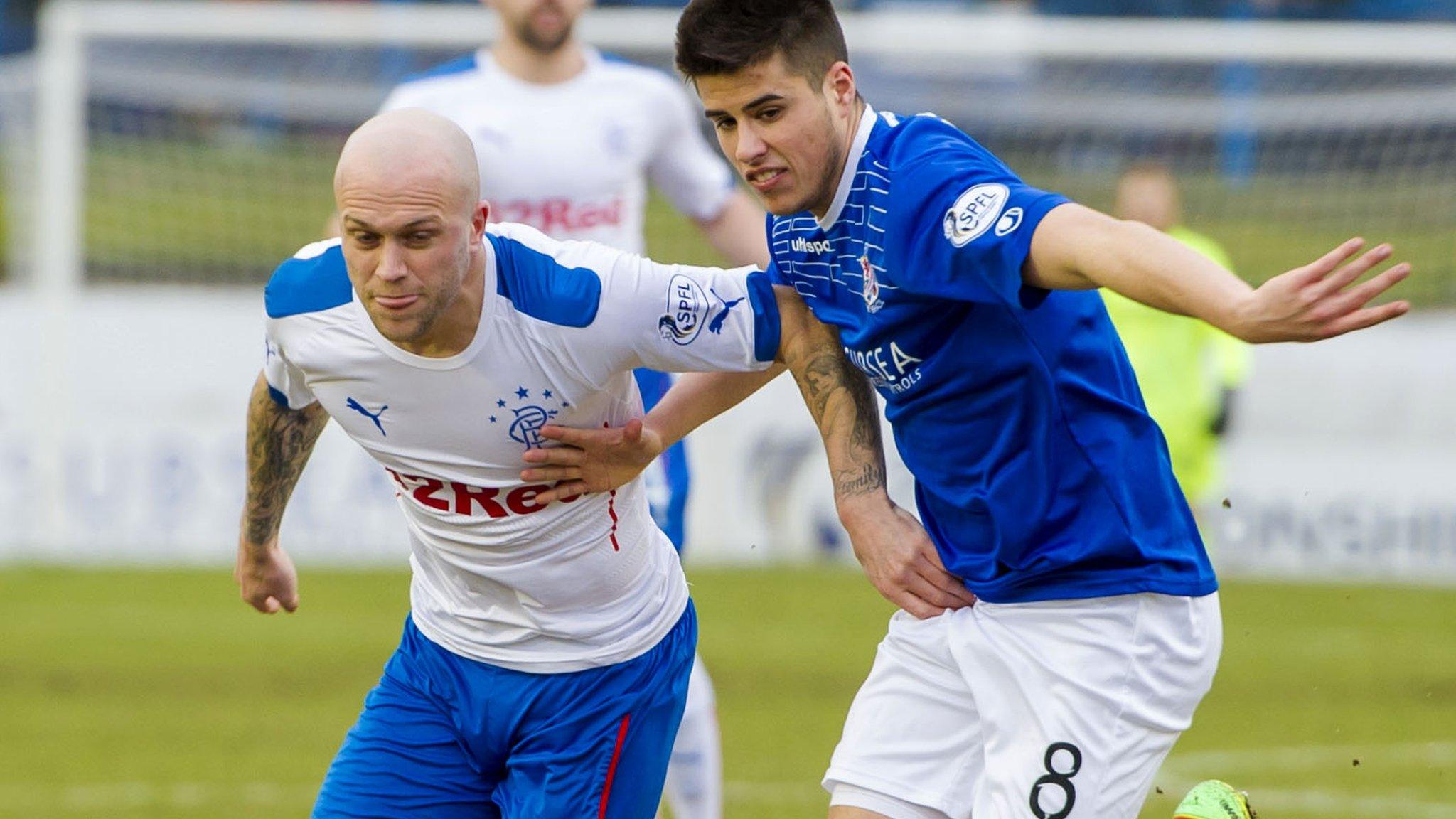
- Published7 March 2015
